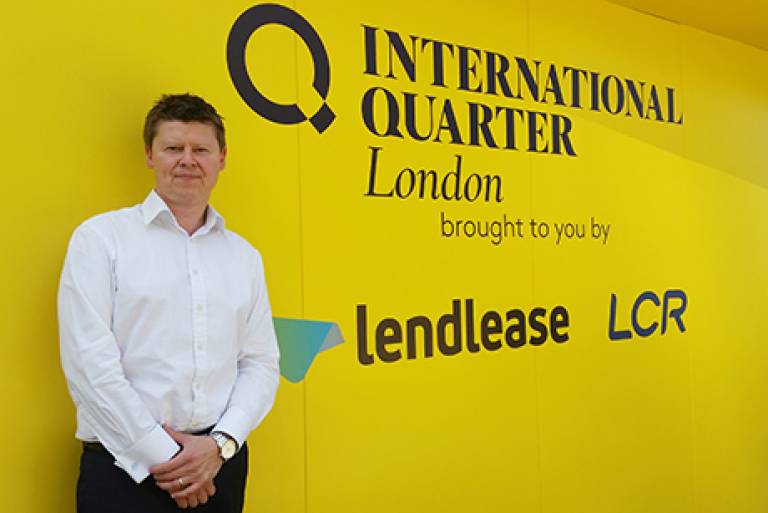People: in focus - Graham Jones, C&PM alumnus, looks back on his studies and industry experience
28 October 2016

Since leaving C&PM almost a decade ago, Graham Jones has been applying his knowledge working in industry. In early August, C&PM caught up with him at his Lendlease offices to learn more about his time at the School and his advice to prospective students.
What is your day-to-day role at Lendlease?
My position is Head of Development Project Management for the commercial development pipeline here at International Quarter, London. This involves developing circa 4m square foot of Grade A commercial office space over the next five to eight years depending on market requirements.
How is Lendlease organised?
Lendlease is structured into Lendlease Development and Lendlease Construction. The development business is further split into two distinct business units: development management and project management. I head the project management unit for the IQL project. Lendlease uses a unique ‘integrated model’ approach which consists of three distinct pillars: ‘origination’, ‘conversion’, and ‘delivery’.
In terms of your time C&PM, what did you find the best?
The Executive nature of the course, primarily. Interdisciplinary Management of Projects [now MSc Strategic Management of Projects] was led by Professor Peter Morris and Professor Andrew Edkins. The range of modules was far reaching and took into account not only project management or technical perspectives, but also developed the business management perspectives as well, seeking to place the project management a project within a wider business-based context.
What were the most challenging aspects of that course?
I undertook the course between 2005 to 2007. The obvious challenge was that I was doing it whilst holding down a full time job. But my employers at the time, Davis Langdon, who were one of co-founding industry sponsors of the course were very supportive. The hook for me was that the course was truly ‘interdisciplinary’ as it took its cohort(s) not just from existing project managers, but also architects, engineers, constructors and the like. It really forced you to reassess the way you think and empathise with the different disciplines sitting down around the design table. It forced you to challenge some of the preconceptions that you had picked up from your own day-to-day work experiences and really break down that potentially ‘siloed thinking’.
Have you been able to apply what you have learnt?
Pretty much every day. One of the things we are trying to do within the development model we have here - for that ‘conversion’ slice that I’m in charge of - is to develop a playbook – or model of operation - for how we do what we do. There’s a lot of good in-house information in the company about governance, control, and what we do corporately to support staff on the ground. However, we are beginning to think about how we deliver that functionally. The ‘Management of Projects’ model developed by Peter Morris and Andrew Edkins, is providing both a foundation and contextual reference point to underpin that thinking and future development.
What does the future hold for you?
I’ve only been with Lendlease for about four months. With such a substantial development pipeline here at IQL, I would be hard pushed to find anywhere else like that at the moment, particularly with the current challenges and opportunities presented by the post-Brexit world.
What advice would you give to prospective or current students that are looking to get into the sector that you are in?
With the IDMP course, it wasn’t just about the pure technical aspects of project management. Yes, we can refer to relevant bodies of knowledge in this area, but it was much more about taking what you do, placing it in that business context, and understanding the investment case. The project you are working on is a means to deliver a series of benefits, gains, and goals. If you want to be successful in this field, look for courses that offer that additional context. By just focusing on the technical side, there is a danger that it becomes purely process driven. One of the fundamental things we talked about was project success and the three strands of this:
- the right project;
- do right project, right;
- do the right project, right, over and over again.
It is being able to define and understanding whether the project that is proposed is the right project to do in the first place, this is fundamental.
 Close
Close

